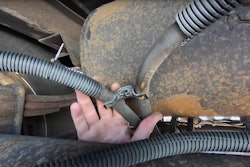Trucking news and briefs for Friday, Oct. 14, 2022:
FMCSA denies petition to put limits on drivers’ personal conveyance use
The Federal Motor Carrier Safety Administration last month denied a petition from the Commercial Vehicle Safety Alliance that asked the agency to add a maximum distance and/or time a driver can use personal conveyance.
The denial has yet to be published in the Federal Register, but it appears on the agency’s Petitions page online.
In a statement to CCJ, FMCSA said it denied the petition “because the agency continues to believe there is insufficient data to support the initiation of a rulemaking” regarding personal conveyance limits.
CVSA first petitioned FMCSA for a personal conveyance definition in December 2018, and FMCSA denied that petition in September 2020. FMCSA had previously issued guidance in June 2018 providing regulatory guidance concerning personal conveyance that FMCSA said “is an appropriate alternative to rulemaking.”
FMCSA’s guidance states that drivers can use personal conveyance “only when the driver is relieved from work and all responsibility for performing work by the motor carrier,” adding that PC can be used even if the truck is laden, “since the load is not being transported for the commercial benefit of the carrier at that time.” Common uses for PC, outlined in FMCSA's guidance, include time spent driving from lodging to a restaurant or entertainment; time spent traveling to a nearby, reasonable, safe location to rest after loading or unloading; and more.
In its March 29, 2022, petition, CVSA said under FMCSA’s current guidance, “a driver could, in theory, drive hundreds of miles over the course of several hours all under the designation of personal conveyance.”
Since electronic logging devices were mandated, said CVSA Executive Director Collin Mooney, there has been an increase in the number of false logs violations -- they accounted for 42.6% of all driver out-of-service violations in the U.S. and Canada during this year’s International Roadcheck. Mooney added that CVSA’s analysis of that data has shown that a lot of those false log violations are a misuse of personal conveyance.
“We definitely see that the data is trending upward,” he said. “Not to say that’s anything new, it’s just because ELDs have made it easier for us to identify falsification issues, whether personal conveyance or otherwise.”
Because FMCSA said it believes there is not enough data to support a new rulemaking to put limits on personal conveyance, Mooney's put CVSA on a path to continue “to monitor and collect additional data, because we don’t believe that this issue is going away any time soon,” he said. “If FMCSA is concerned they don’t have sufficient data, we will be in data collection and analysis mode to provide them with the information that they feel necessary to implement a rule.”
Mooney said the biggest issue CVSA sees with the current PC guidance is that it’s subjective. “It’s not definable or measurable, like distance or time period,” he said. As with any regulation, Mooney added, “in order for it to be enforced effectively, it needs to be measurable.”
As far as an actual limit CVSA would like to see, its March petition pointed to Canada’s personal conveyance regulation, which allows drivers to use a vehicle for personal conveyance purposes for a maximum of 75 kilometers per day (approximately 46 miles), unladen.
CarriersEdge intros new training resource library
CarriersEdge recently introduced a new resource library to the CarriersEdge platform that is designed to help drivers apply information that is covered in CarriersEdge online training courses into real-world use.
The new resource library, called “Put it into Practice” (PiiPs), provides fleets with a list of subject-specific follow up activity ideas that company administrators can use to help drivers better comprehend or retain concepts covered in driver training courses. PiiPs give administrators suggestions on how to use driver incentives, surveys, social media, classroom activities, hands-on practice, driver communication strategies and more to better support driver education and safety programs.
According to Jane Jazrawy, CEO of CarriersEdge, information CarriersEdge collects through the Best Fleets to Drive For program inspired the decision to add PiiPs to its online training platform. Best Fleets to Drive For, created by CarriersEdge in 2008 and produced in partnership with Truckload Carriers Association, is an annual program dedicated to identifying the best workplaces in the North American trucking industry.
“Through our evaluations of fleets nominated for the Best Fleets to Drive For program, we’ve found that the top performing companies have comprehensive driver training programs, and that most use a combination of training follow-up activities to support drivers in their education,” said Jazrawy. “Many of the ideas we’ve added to PiiPs were influenced by the activities the Best Fleets are having success with. We expect this new library of training follow-up activities to be a great resource for fleets to support driver education and fleet safety.”
PiiPs are currently available for several popular CarriersEdge courses, including distracted driving, defensive driving, injury prevention, vehicle inspection, weights & dimensions, and more. CarriersEdge will continue to add PiiPs for other courses in the library, and in languages including French and Spanish.
The new PiiPs feature is available to customers now at no extra charge, as part of the CarriersEdge subscription service. CarriersEdge has more than 100 online driver training courses accessible in its monthly subscription package, with new and updated titles added regularly. Courses are offered as full-length orientation, short refresher and remedial titles, and as standalone knowledge tests.
Ryder names Carrier Quality Awards winners
Ryder System announced this week its top carrier selections for the 25th annual Ryder Carrier Quality Awards, which recognizes United States- and Canada-based carriers for service quality and operational excellence based on a variety of metrics, including on-time performance, customer service, economic value, claims handling, and commitment to innovation.
“Technology and innovation have never been more important in the transportation and logistics industry," said Dave Belter, vice president and general manager of transportation management for Ryder. "In fact, they’ve become critical drivers of performance, value, and service."
Ryder manages a network of thousands of carriers to help move more than $7 billion in freight purchased and/or executed on behalf of its customers annually. The recipients of this year’s Ryder Carrier Quality Awards are:
- Most Innovative Carrier of the Year — Cowan Systems (CCJ Top 250, No. 55)
- National Dry Van Carrier of the Year — Mesilla Valley Transportation (No. 68)
- Regional Dry Van Carrier of the Year — Erives Enterprises
- Intermodal Carrier of the Year — J.B. Hunt Transport (No. 3)
- Refrigerated Carrier of the Year — Prime, Inc. (No. 16)
- Flatbed Carrier of the Year — Melton Truck Lines (No. 84)
- National LTL Carrier of the Year — Estes Express Lines (No. 11)
- Regional LTL Carrier of the Year — Dayton Freight Lines (No. 51)
- Oil & Gas Carrier of the Year — Press Energy Services LLC
- Canadian Truckload Carrier of the Year — Charger Logistics (No. 191)
- Canadian LTL Carrier of the Year — Consolidated Fastfrate
- Freight Forwarder of the Year — Masterpiece International
- Maritime Carrier of the Year — Pilot Freight Services
"Cowan Systems is proud to be recognized as Ryder's Most Innovative Carrier of the Year," said Chris Hichew, director of IT business solutions for Cowan. "Driven by our entrepreneurial spirit, we continue to make substantial investments in our internal technical teams and capabilities in support of our company vision to be the carrier of choice for both our customers and our drivers. We look forward to our continued partnership with Ryder as we work together to further embrace technology and innovation in the pursuit of delivering the quality of service and value that our mutual customers have come to expect."











